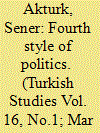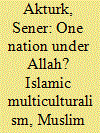|
|
|
Sort Order |
|
|
|
Items / Page
|
|
|
|
|
|
|
| Srl | Item |
| 1 |
ID:
137426


|
|
|
|
|
| Summary/Abstract |
This article discusses the political origins, present-day significance, and implications of the intellectual movement known as “Eurasianism” in Turkey, a movement with Euroskeptic, anti-American, Russophile, neo-nationalist, secularist, and authoritarian tendencies, and including among its ranks socialists, nationalists, Kemalists, and Maoists. Since the turn of the twenty-first century, Eurasianism emerged as a major intellectual movement in Turkey, competing against Pan-Islamism, Pan-Turkism, and Westernism. Aspiration for a pro-Russian orientation in foreign policy, and a socialist–nationalist, Left-Kemalist government at home are the international and domestic faces of Turkish Eurasianism, which distinguish this movement from others. These orientations and their origins are situated within the history of intellectual movements in Turkey, going back to the Kadro and Yön movements in the 1930s and the 1960s, respectively. Similarities and actual links between Russian and Turkish Eurasianism are also discussed.
|
|
|
|
|
|
|
|
|
|
|
|
|
|
|
|
| 2 |
ID:
160435


|
|
|
|
|
| Summary/Abstract |
A number of reforms and initiatives, undertaken by the Justice and Development Party (AKP or AK Party) governments in Turkey, widely known as Kurdish and Alevi ‘openings,’ and the less prominent non-Muslim (primarily Armenian and Jewish) openings, have puzzled scholars as to their causes, consequences, and limitations. In this article, I first briefly review four different kinds of analytical accounts that seek to explain the AK Party’s openings. Second, I introduce my argument that an Islamic conceptualization of a new religious-national identity is both the main motivation and the main limitation of these reformist initiatives. Third, I provide an analysis of critical speeches, official statements, and declarations by AK Party leaders, in particular by Recep Tayyip Erdoğan, on the Kurdish, Alevi, and non-Muslim openings, demonstrating that they invoke overwhelmingly religious justifications.
|
|
|
|
|
|
|
|
|
|
|
|
|
|
|
|
| 3 |
ID:
092495


|
|
|
|
|
| Publication |
2009.
|
| Summary/Abstract |
The definition of Turkish nationhood after the founding of the Republic has been evaluated and labelled very differently by various scholars. The classical view paralleled the official representation of Republican policies in describing Turkish nationhood as being based on a civic and territorial understanding of nationality. More recent and much more critical scholarship, which enjoys a near-hegemonic position in the study of Turkish nationalism today, claims that the official definition of Turkish nationhood has a clearly identifiable mono-ethnic orientation, manifest in a series of policies and institutions. This article argues that the definition of Turkish nationhood as manifest in state policies is neither territorial nor mono-ethnic, but rather ironically for the adamantly secular Turkish republic, the definition of Turkish nationhood is mono-religious and anti-ethnic, in striking continuity with the Islamic millet under the Ottoman Empire. The reason critical scholars perceive Turkish nationhood as mono-ethnic might stem from the dichotomous view of nationalisms as civic versus ethnic, a dichotomy that has recently been repudiated by some of its erstwhile proponents. Supremacy of the religious over ethnic categories in Turkey, as a historical legacy of the Ottoman millet system, might be applicable to most post-Ottoman states in the Islamic Middle East and North Africa, in contrast to the interplay of ethnicity and religion in Western Europe. This view of Turkish nationhood is confirmed by a dozen interviews that the author conducted with members of the political and intellectual elite of different ideological orientations in Turkey. It is then demonstrated how the new efforts at reformulating modern Turkish identity with reference to Ottoman and Islamic conceptions lead to new inclusion-exclusion dynamics with the Kurds and the Alevis, suggesting that a truly inclusive reformulation has to follow secular and territorial principles.
|
|
|
|
|
|
|
|
|
|
|
|
|
|
|
|
| 4 |
ID:
102712


|
|
|
| 5 |
ID:
073965


|
|
|
|
|
| Publication |
2006.
|
| Summary/Abstract |
This article examines the increasing and intensified cooperation between Russia and Turkey as a central feature of Central Eurasia's post?Cold War restructuring, and seeks to explain their cooperation with reference to major theories of international relations. It argues that the diminution of the Russian threat is what allowed for the possibility of Turkish-Russian cooperation.
|
|
|
|
|
|
|
|
|
|
|
|
|
|
|
|
|
|
|
|
|